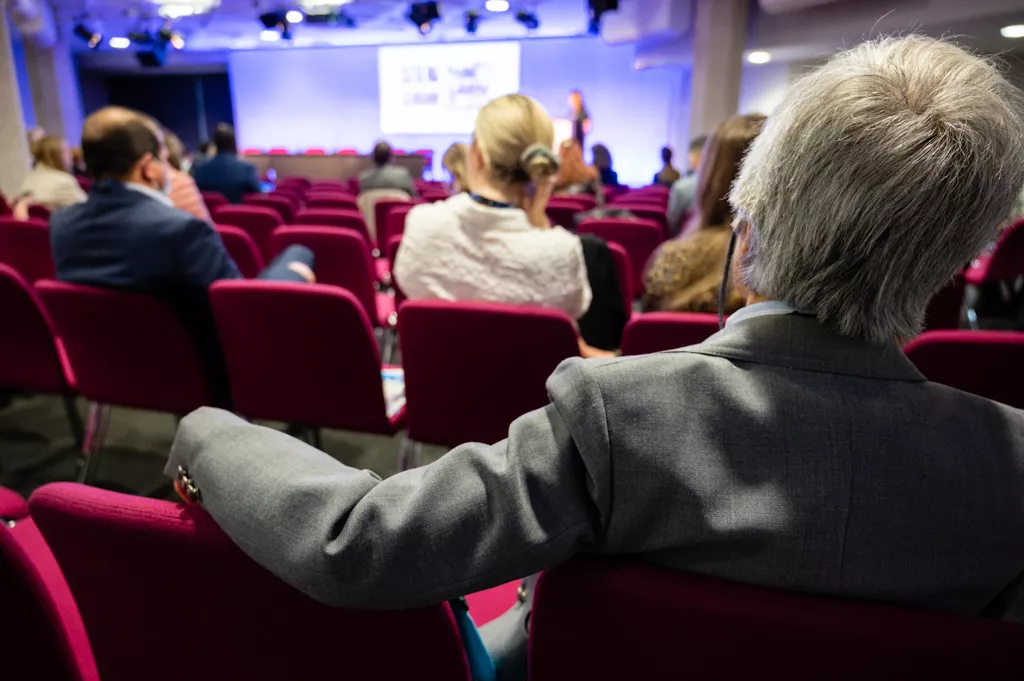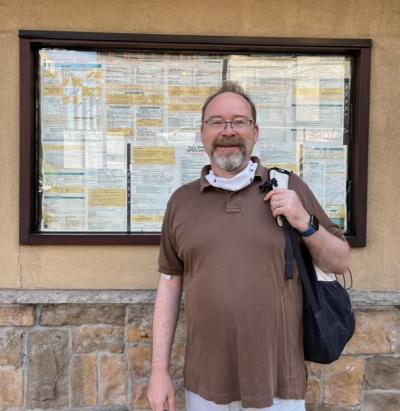
Barrister and type 1 diabetes blogger Rob Darbyshire reviews his three days at the Diabetes UK Professional Conference in April, including his session highlights and lessons learned.

Last month, I was lucky enough to get an invitation to Diabetes UK’s Professional Conference. As someone living with type 1 diabetes and no medical training beyond half a century of trying to tame the beast that is blood sugar, it was quite a privilege.
This year’s three-day conference took place in Liverpool’s Exhibition Centre and Arena.
Day 1 – Diabetes Nerd Heaven!
So – to business. A huge part of this event is networking. Over 2,000 consultants, junior doctors, diabetes specialist nurses, academics, practice managers and so on gather in Liverpool to renew friendships and share their experiences informally.
And I’ve learned! The first presentation of the conference was on “Nature or nurture”. For people living with type 1 diabetes, Professor Ines Barrosso of Exeter University spoke of her research into the genes associated with type 1. They’re now pretty clearly identified and partially explain this statistic, that having a brother, sister or parent with type 1 increases your risk by 3-22x.
But if one identical twin develops type 1, there’s only a 40% chance that the other will. And from that we can conclude that whilst there is a genetic component, there is also an environmental one.
With type 2 diabetes, there is a well-understood link with obesity, and there’s a genetic component. But for anyone who wants to say that one totally excludes the other, here’s a stat: The Pima Indians of Arizona and Mexico are the ethnic group with the highest incidence of type 2 in the world, at 50%. But those that live in Arizona, within the relative affluence and cheap calories of the USA, have rates above 50%, but their cousins in Mexico, in more straightened circumstances? 5%. The genes are playing their part, but so is lifestyle.
In terms of my wider experience of the healthcare professionals, it’s become clear over the last 24 hours that the value of our “lived experience” is obvious to the clinical community. There are repeated statements about the need to listen to people living with diabetes, ask what they want and ask how the medics can help. There’s recognition, albeit with mixed levels of sensitivity, that the real experts in this condition are the people living with it.
Day 2 – Grand Challenges!
On Day 2, I was able to spend more time in the presentations (and not just because I needed to sit down). The day opened with an impressive lecture about the genetic links to the different types of diabetes. For me the takeaway was that Black and South Asian people develop type 2 diabetes at a lower weight than white people.
After lunch we learned of the Grand Challenge. The Steve Morgan Foundation has donated an enormous £50 million for research into type 1 diabetes, and its cure through the development of robust stem cells that can grow into beta cells (without dying too quickly – that’s the barrier right now) and the development of smart insulins... As challenges go, 'Grand' is an understatement.
As transplanted beta cells live longer and longer in their new homes, they present different problems over time. Slowly but surely, these problems are being overcome, and real advances are being achieved already.
I finished the formal part of the day listening in to the discussions on eating disorders in diabetes. A shocking 40% of teenage girls living with type 1 in the UK suffer from a degree of diabulimia. We were addressed by the awe-inspiring Jennifer Mahammodi. Jennifer was diagnosed at the age of 12. Her mother found it hard to help her manage with the result that there were a series of DKA hospital admissions. Ultimately, living in social housing at the age of 19 she suffered, alone, a devastating Christmas Day DKA episode.
Thankfully, her hospital care team were able to provide psychological support and get her to a very much better place. It was deeply moving: amongst dozens of battle-hardened healthcare professionals there were very few dry eyes and it was the only address that I saw receive a standing ovation.
To cap off the day, I attended the presentation of a research impact award to Professor Roy Taylor. He’d been quite a presence at the conference putting questions to different panels with incisive intelligence and a dry wit. He pioneered the remission of type 2 diabetes through rapid weight loss. As one of his colleagues pointed out to me, even if the diabetes isn’t put into remission, weight loss is still a good idea for many people living with type 2.
Day 3 – Diabetes Glastonbury
Happily, like the Sunday of Glastonbury, Day 3 of the Diabetes UK Professional conference was a bit more relaxed.
Professor Helen Murphy spoke of the importance of preparing women with diabetes for pregnancy. A lot of us worry about that for ourselves and our daughters and it surprised me that I hadn’t come across this. Here’s the message:
- take 5mg of folic acid daily
- get HbA1c down as low as possible, ideally below 43mmol/mol (6.1%)
- check with a primary care doctor about medications that aren’t great during pregnancy (e.g. blood pressure control tablets or statins)
These things massively improve the odds of a successful pregnancy.
The final session of the day was presented by Professor May Ng, Dr Tom Crabtree and Dr Clare Hambling. Tom spoke on the success of the NHS England hybrid closed loop pilot to see the effect on reduction in HbA1c among children using these systems, and Clare on how they might be rolled out in practice.
So, that’s it from me at this year’s Diabetes UK Professional Conference. It was an incredible privilege to be amongst these impressive researchers and healthcare professionals. Their brilliance and commitment to the cause was beyond question. There’s going to be a lot of people getting better care next week as the connections and ideas exchanged this week feed back into front line practice.
